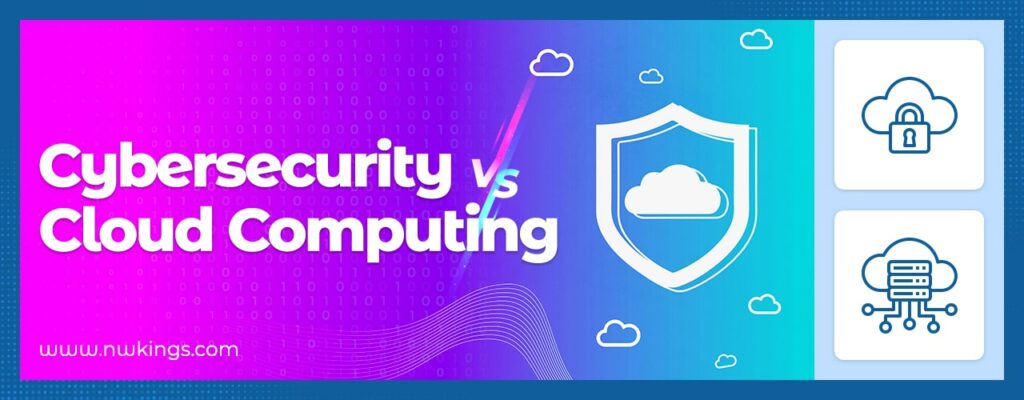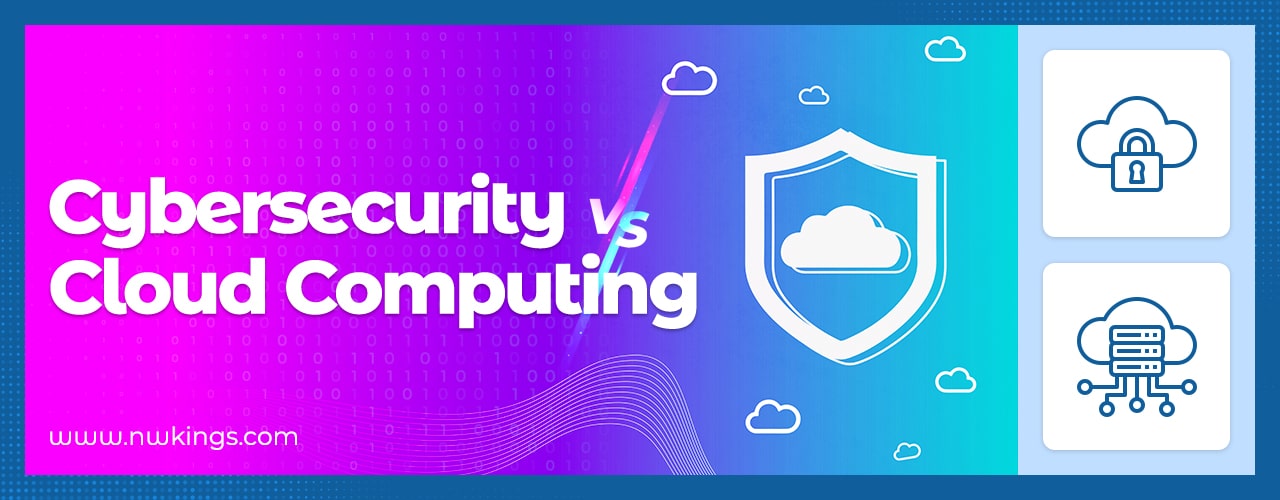
While Cloud Computing offers a range of benefits like scalability, cost-effectiveness, and flexibility, it also poses several security challenges. And Cybersecurity encompasses a range of practices, technologies, and frameworks that aim to secure data, systems, and networks from malicious attacks.
Keep reading the blog till the end to know the ultimate truth regarding “Cybersecurity vs Cloud Computing” in detail to advance your tech knowledge.
What is Cybersecurity?
Cybersecurity refers to the process of protecting networks, devices, and data from unauthorized access, theft, and damage. It involves a range of practices, including firewalls, antivirus software, intrusion detection systems, and access controls.
What is Cloud Computing?
Cloud Computing refers to delivering services like servers, storage, databases, and software over the internet by enabling organizations to access computing resources on-demand rather than investing in and managing their own IT infrastructure.
What is the difference between Cybersecurity and Cloud Computing in IT?
With businesses and organizations increasingly shifting their operations to cloud-based systems, it’s crucial to understand the complex interplay between cybersecurity and cloud computing.
CYBERSECURITY VS CLOUD COMPUTING
The difference between cybersecurity and cloud computing is as follows-
CYBERSECURITY | CLOUD COMPUTING | |
DEFINITION | Cybersecurity means protecting computer systems, networks, and data from unauthorized access, theft, and damage. | Cloud Computing means delivering computing services, including software, storage, and processing power, over the internet. |
FOCUS | Cybersecurity focuses on securing data and systems from cyber threats. | Cloud Computing focuses on delivering computing services through the internet. |
THREATS | Cybersecurity deals with various cyber threats like hacking, malware, phishing, ransomware, and other cyber attacks. | Cloud Computing deals with security issues such as data breaches, identity theft, and loss of control over sensitive data. |
GOALS | Cybersecurity preserves the confidentiality, integrity, and availability of data and systems. | Cloud computing provides reliable, scalable, and cost-effective computing services. |
SCOPE | Cybersecurity is concerned with securing the data and systems within an organization. | Cloud computing is concerned with providing computing services to a broad range of customers. |
EXPERTISE | Cybersecurity requires specialized security protocols, risk management, and incident response. | Cloud Computing requires expertise in cloud architecture, scalability, and resource allocation. |
TOOLS | Cybersecurity uses various security tools, such as firewalls, antivirus software, intrusion detection systems, and security information and event management (SIEM) solutions. | Cloud Computing uses platforms such as Amazon Web Services (AWS), Microsoft Azure, and Google Cloud Platform (GCP). |
DEPLOYMENT | Cybersecurity solutions are deployed on-premise or in the cloud, depending on the organization’s security requirements. | Cloud Computing services get deployed in the cloud. |
ACCESS | Cybersecurity is concerned with controlling access to data and systems within an organization. | Cloud computing is concerned with controlling access to computing resources provided by a cloud service provider. |
STANDARD | Cybersecurity is subject to various security standards, such as ISO 27001, PCI-DSS, and HIPAA. | Cloud computing is subject to cloud security standards, such as the Cloud Security Alliance (CSA) and the NIST Cloud Computing Security Reference Architecture. |
COMPLIANCE | Cybersecurity ensures compliance with various regulations, such as GDPR, CCPA, and SOX. | Cloud Computing ensures compliance with cloud service provider regulations and policies. |
RISK MANAGEMENT | Cybersecurity focuses on risk management, identifying potential threats and vulnerabilities, and taking appropriate measures to mitigate them. | Cloud Computing also focuses on risk management, but from a service provider perspective, ensuring that customers’ data and systems are secure. |
COST | Cybersecurity can be costly, requiring significant investment in security tools, personnel, and training. | Cloud Computing can be cost-effective, allowing customers to pay only for the resources they use. |
SCALABILITY | Cybersecurity is less scalable, requiring significant effort to scale security solutions across an organization. | Cloud Computing is highly scalable, allowing customers to quickly and easily scale up or down their computing resources as needed. |
TRAINING | Cybersecurity requires specialized training in security protocols, incident response, and risk management. | Cloud Computing demands training in cloud architecture, platforms, and resource allocation. |
INTEGRATION | Cybersecurity solutions integrate into an organization’s existing IT infrastructure. | Cloud Computing services integrate into an organization’s existing cloud strategy and infrastructure. |
IMPACT | Cybersecurity breaches can impact an organization’s reputation, customer trust, and financial stability. | Cloud Computing outages can also impact customer trust and financial stability. |
LEGAL ASPECTS | Cybersecurity has significant legal implications, including data privacy regulations, liability, and incident reporting requirements. | Cloud Computing also has legal implications, including data ownership, data residency, and contractual obligations between cloud service providers and customers. |
MAINTENANCE | Cybersecurity solutions require ongoing maintenance, including regular security updates, vulnerability assessments, and penetration testing. | Cloud Computing services also demand maintenance, including regular updates, backups, and disaster recovery testing. |
COLLABORATION | Cybersecurity requires collaboration between various departments of an organization, including IT, legal, compliance, and risk management. | Cloud Computing also require collaboration between cloud service providers and customers to ensure the security and reliability of cloud services. |
What are the similarities between Cybersecurity and Cloud Computing in IT?
The similarities between cybersecurity and cloud computing are as follows-
- Both are critical components of modern information technology infrastructure.
- Both involve protecting data, applications, and networks from unauthorized access, theft, and other cyber threats.
- Both constantly evolve to keep up with new threats and technologies.
- Both require a proactive approach to detect and prevent security breaches.
- Both require expertise in technology and risk management.
- Both share a responsibility model, with customers responsible for securing their data and applications in the cloud.
- Both require regular updates and maintenance to ensure optimal performance and security.
- Both involve a complex web of technology, people, and processes that work together effectively.
- Both involve monitoring unusual activity and suspicious behaviour.
- Both require security tools such as firewalls, intrusion detection and prevention systems, and encryption.
- Both demand ongoing training and education to stay up-to-date with the latest security threats and technologies.
- Both involve compliance with various regulatory standards, such as HIPAA, GDPR, and PCI DSS.
- Both involve risk assessments to identify potential vulnerabilities and threats.
- Both require incident response plans in case of a security breach.
- Both impact multiple areas of an organization, from IT to business operations and strategy.
Which is better - Cybersecurity or Cloud Computing?
Both are crucial for businesses and organizations in today’s digital landscape. Companies must ensure the security and privacy of their data and infrastructure while using cloud computing services, which often get targeted by cybercriminals. Therefore, it’s essential to have a cybersecurity strategy in place to protect cloud resources.
Cybersecurity and Cloud Computing play vital roles in the digital world, and companies must prioritize both to ensure their security, privacy, and work efficiency.
What courses are available in Cybersecurity and Cloud Computing?
The top courses available in cybersecurity are as follows-
- CEH (V12)
- CISSP Training
- CompTIA PenTest+
- CompTIA Security+
- CompTIA CySA+
- Palo Alto Firewall
- CheckPoint Firewall
- Fortigate Firewall
- ASA & FTD Firewall
- Sophos XG
The top courses available in cloud computing are as follows-
What are the available job roles in Cybersecurity and Cloud Computing?
The top job roles available in cybersecurity are as follows-
- Security Analyst
- Security Engineer
- Penetration Tester (also known as Ethical Hacker)
- Security Architect
- Cybersecurity Engineer
- Network Security Engineer
- Cybersecurity Manager
- Chief Information Security Officer (CISO)
- Incident Responder
- Cryptographer
- Security Software Developer
- Security Auditor
- Vulnerability Assessor
- Forensic Expert
- Cybersecurity Trainer/Instructor
The top job roles available in cloud computing are as follows-
- Cloud Architect
- Cloud Engineer
- Cloud Developer
- Cloud Administrator
- Cloud Consultant
- Cloud Security Specialist
- DevOps Engineer
- Site Reliability Engineer (SRE)
- Cloud Data Engineer
- Cloud Infrastructure Engineer
- Cloud Project Manager
- Cloud Sales Executive
- Cloud Operations Engineer
- Cloud Support Engineer
- Cloud Solution Architect
What are the salary packages for Cybersecurity and Cloud Computing candidates?
The salary aspect in cybersecurity is as follows-
- United States: $80,000 – $150,000
- Canada: CAD 70,000 – CAD 120,000
- United Kingdom: £35,000 – £85,000
- Germany: €45,000 – €95,000
- France: €40,000 – €90,000
- Australia: AUD 70,000 – AUD 150,000
- United Arab Emirates: AED 120,000 – AED 360,000
- Singapore: SGD 70,000 – SGD 150,000
- India: INR 600,000 – INR 2,000,000
- China: CNY 200,000 – CNY 500,000 per year
The salary aspect in cloud computing is as follows-
- United States: $90,000 to $150,000
- Canada: CAD 80,000 to CAD 130,000
- United Kingdom: £50,000 to £85,000
- Germany: €50,000 to €95,000
- France: €40,000 to €80,000
- Australia: AUD 100,000 to AUD 150,000
- Singapore: SGD 60,000 to SGD 120,000
- India: INR 500,000 to INR 1,500,000
- United Arab Emirates: AED 150,000 to AED 300,000
- South Africa: ZAR 300,000 to ZAR 800,000
Wrapping Up!
The topic “Cybersecurity vs Cloud Computing” has gained popularity worldwide and continues to evolve. Therefore, the comparison above depicts an in-depth understanding of both concepts by making them straightforward.
Hence, do not hesitate to reach us with your queries. Also, enroll today in the top cybersecurity and cloud computing courses to get a free demo session from experts worth $70 to begin your IT journey.
Happy Learning!


